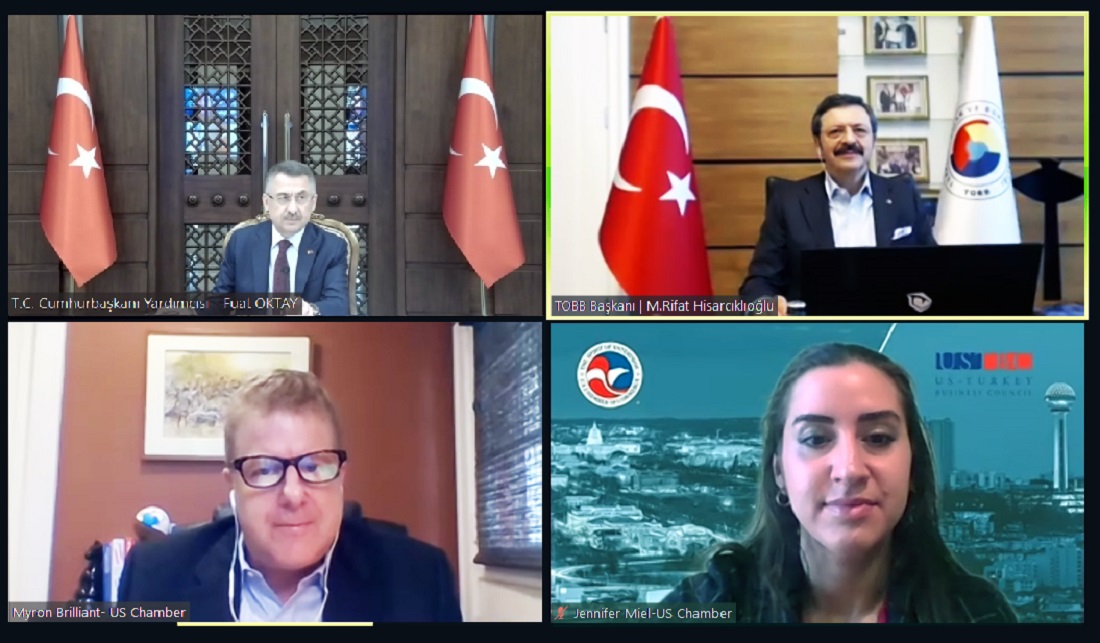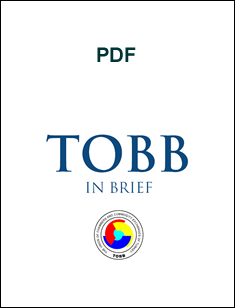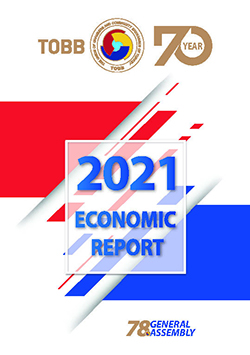Hisarcıklıoğlu discusses Turkey-US trade relations

19.06.2020 / Ankara
The Union of Chambers and Commodity Exchanges of Turkey (TOBB) President Rifat Hisarcıklıoğlu stated that the Free Trade Agreement is important for Turkey and U.S. trade relations, “On the road to a Free Trade Agreement, the Preferential Trade Agreement between the two countries will be very helpful. If this happens, there will be a win-win situation for both countries.”
A video conference with the cooperation of U.S. Chamber of Commerce - U.S.-Turkey Business Council and the Union of Chambers Commodity Exchanges of Turkey (TOBB) and Vice President Fuat Oktay. The meeting began with opening speeches by Vice President Fuat Oktay, TOBB President M. Rifat Hisarcıklıoğlu and Myron Brilliant, Senior Vice President of the U.S. Chamber of Commerce and Head of the Department of International Relations.
Vice President Fuat Oktay answered questions posed by U.S. Chamber of Commerce member companies, moderated by Jennifer Miel, General Director of the U.S.-Turkey Business Council of the U.S. Chamber of Commerce.
Pointing out that there is a long-term cooperation between the U.S. Chamber of Commerce and TOBB, Hisarcıklıoğlu said that they are working together to resolve issues that hinder trade and investment between the two countries and will continue to cooperate.
- “Turkey can be a good alternative to China”
Hisarcıklıoğlu, stating that business people always see opportunities in times of crisis, said, “We know that there are significant declines in China's domestic and foreign trade. Thanks to its advanced economy and qualified workforce, we believe that Turkey can be a good alternative to China.”
Stating that Turkey is an industrial giant today, Hisarcıklıoğlu reported that Turkey is Europe’s largest supplier for textile, house appliance, automotive, iron and steel, glassware, food and furniture sectors.
Hisarcıklıoğlu, emphasizing that it is possible for both countries to come out of the crisis stronger and closer together, said:
“We need the support of our leaders on certain issues to achieve the $100 billion trade volume goal. As the United States renegotiates existing trade agreements, TOBB and the U.S. Chamber of Commerce will continue to defend the bilateral Free Trade Agreement. On the road to the Free Trade Agreement, the Preferential Trade Agreement between the two countries will help a lot to speed up the process. If this happens, there will be a win-win situation for both countries.”
- “There is a lot to do together in third countries”
Hisarcıklıoğlu stated that the two countries can focus on promoting strategic cooperation in innovation and new technologies, and said construction and infrastructure are the other sectors to be prioritized in the post-Covid-19 period.
Hisarcıklıoğlu, “Turkish contractors are second in the world after China in terms of the number of foreign projects. There is a lot that can be done together in third countries.”
Hisarcıklıoğlu emphasized that Turkey should be re-incorporated into the Generalized Preferences System, stressing that the “Section 232” decision which would entail additional customs duties on steel and aluminum should not be on the agenda.
- “Unilateral, discriminatory taxes should be avoided”
Hisarcıklıoğlu noting that anti-dumping and similar investigations should be avoided regarding products imported from Turkey such as pasta, steel and beds.
TOBB President Hisarcıklıoğlu said, “These measures will damage U.S.-Turkey private sector cooperation. I hope American policymakers will seek a win-win strategy instead of anti-dumping practices. This strategy will provide mutual economic benefits to both countries.”
Referring to the US launch of a review of countries that impose digital service tax, Hisarcıklıoğlu said, “We are aware that the outcome of this investigation could lead to new customs duties on Turkey's exports to the United States. Parties should avoid unilateral, discriminatory taxes.”
- Vice President Oktay
Vice President Fuat Oktay stated that both chambers of commerce are cooperating on the issue of the negative effects of Covid-19, “Turkey-U.S. economic cooperation will continue to develop in these difficult times and will even create new opportunities in the wake of this crisis.”
Oktay stressed that the partnership between the United States and Turkey has been going on for more than 70 years, “Especially Syria remains an important conflict area that requires Turkey and the United States to work together for common purpose and interests.”
Oktay, emphasizing that there are still contradictory thoughts between Turkey and the United States in regards to the issues such as the fight against FETÖ, YPG/PKK, F-35 agreement, “The biased approach of the US legislative branch to Turkey. It is very important that the US business community is aware of these differences between the two countries and that they can be resolved in a way that is at least costly to the United States and which can be most beneficial to our relationship.”
Stressing that trade and business partnerships between the United States and Turkey have increased in the last 10 years, Oktay said, “Even if we have seen great volumes of trade and investment and commercial balance development in recent years, these are not enough when looking at the potential between the two countries. Looking at the $100 billion trade target set by Erdoğan and Trump, this has not yet been reached. Turkey remains committed to its promise to achieve this goal.”
Oktay underlined the need for concrete and tangible solutions to meet the trade volume target between the two countries, and said that ministerial-level talks are ongoing between the United States and Turkey on areas how exports can be developed.
noting that effort is necessary to reduce the effects of upcoming elections in the United States to trade between the two countries, Oktay said that clothing, home textiles, furniture, jewelry, home appliances and construction materials are among the sectors that the United States and Turkey prioritize.
“At the same time, we believe that Turkey should be exempt from us steel and aluminum customs duties. We are also concerned about the US Trade Representative's digital service tax investigation against some countries, including Turkey. I must underline that our recent application for a digital service tax is not targeting any country or in the favor of any country. As the digital economy grows, profit and profit margins are growing in this direction.”
- “We are working for positive economic growth at the end of the year”
Oktay stated that at the height of the Covid-19 outbreak, Turkey has proven to be a reliable hub in the global supply and logistics chain, “As the reliability of the supply chain becomes more important, we hope that Turkey's strong production infrastructure, as well as the young and skilled workforce, will become more attractive to US investors.
Pointing out that about 2,000 American companies operate in Turkey, Oktay said Turkey is ready to host more.
Compared to many developing countries, Turkey offers broad opportunities for access to the market, Oktay said, adding that the country is committed to creating a stronger, more competitive and liberal business environment.
Recalling that Turkey's economy grew by 4.5 percent in the first quarter of this year, Oktay said, “Although a contraction is expected in the second quarter due to Covid-19 measures, we are working for positive economic growth at the end of the year.”
- “We are determined to play a leading role in digitalization”
Oktay underlined that Turkey continues to be a center of attraction with its production potential, human resources and opportunities for foreign investors, noting that there is no distinction between foreign companies and domestic companies, and that Turkey aims to facilitate doing business by simplifying all legal procedures and eliminating bureaucratic barriers.
Turkey's World Bank's Ease of Doing Business Index this year has improved in 6 of the 10 indicators, Oktay noted that the goal is to be among the top 20 countries in terms of ease of doing business.
Oktay also stated that they are interested in projects that will serve Turkey's technological transformation, “We are careful to identify new investment areas such as digitalization, energy, intelligent infrastructure and cities. Covid-19 emphasizes the importance of the digital economy and digitalization on everyone's agenda. As Turkey, we are determined to adapt to this and play a leading role in digitalization.”
- “Our manufacturers have proven their credibility”
Stating that Turkey is the second most imported country in Europe and Central Asia as of last year, Oktay said that the United States has passed Turkey's traditional suppliers in February in natural gas supply, and that competitive prices of LNG will encourage Turkish companies to make more deals with American energy suppliers in the future. Oktay noted that renewable energy has also come to the fore as a growing area in Investment Relations in Turkey and the United States.
Referring to the cooperation of the two countries in the defense industry, Oktay underlined that companies such as Boeing, Lockheed Martin, Northrop Grumman, Raytheon and Sikorsky continue to buy critical materials from Turkish manufacturers.
Oktay reminded that the two countries also cooperate on projects such as F-35 and T129 ATAK helicopters, stressing that Turkey does not want to jeopardize F-35 technology.
“Our manufacturers have proved their credibility by continuing to supply key parts of the aircraft despite the pandemic, even though we have been unfairly suspended in the F-35 program.”
U.S. government reports that Turkey's suspension in the program poses a production risk for critical components of aircraft, delays production schedule and increases cost, Oktay said, adding that restrictions in the field of defense should end.
On a question about the $100 billion trade volume target between Turkey and the United States and the Digital Service Tax, Oktay said that there are various barriers to trade between the two countries, but that the Digital Service Tax is not one of these obstacles.
Underlining that digitalization is one of the areas that they care about most, Oktay said that electronic commerce is growing very fast and that further development of e-commerce companies in Turkey has become their primary priorities.
Oktay, touching on the digital service tax rate is 7.5 percent aims to encourage the development of domestic companies with regards to surveys and that the will be re-evaluated according to needs.
- Digital Service Tax is not only aimed at the United States
“Perhaps the right strategy for US companies is either to invest in Turkey or find a partner in Turkey.”
Noting that digital service tax is not a tax only for the United States, Oktay said this applies to all companies serving in Turkey.
Oktay, “The response to the Digital Service Tax should not be like removing Turkey from the Generalized Preferences System (GTS), starting an investigation, or bringing more obstacles to the business world of both countries. It would do more damage.” he said.
Explaining that Turkey is trying to turn all negative issues into positives and addressing the problems separately, Oktay said, “We never confuse one issue with another. We never confuse F-35s and S400s or other political issues. As Turkey, we have learned to deal with all these problems one by one. We do not put all these issues in one piece, we separate them and solve them one by one.”
- “We cover almost 70 percent of our own defense needs from the domestic market”
Stressing that Turkey's defense industry has been on the rise in recent years, Oktay said: “We meet almost 70 percent of our own defense needs from the domestic market. This is also an area where we can cooperate with other countries. We are also working with the United States on this.”
Oktay pointed out that Turkey and the United States have a field of cooperation in defense, from jet systems to artificial intelligence, noting that there are opportunities for cooperation in the energy sector.
Stressing that there are opportunities for cooperation between the United States and Turkey in the health sector, Oktay said, “We saw the potential for great cooperation in the field of health care sector during the Kovid-19 period. We've invested in health care for the last 18 years. Turkey is one of the countries that provides the best health care.”
Pointing to the potential for cooperation between the United States and Turkey on electric cars, Oktay said, “Once we start working, we will see that the issues that bring us together are more of a matter that separates us from each other. That's when a win-win situation will be revealed for everyone.”
Your message has been sent
Thank you |




